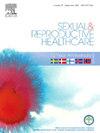The need for preconception care: Australian women’s health beliefs, expectations, and trust in healthcare
IF 1.7
3区 医学
Q3 PUBLIC, ENVIRONMENTAL & OCCUPATIONAL HEALTH
引用次数: 0
Abstract
Introduction
Preconception care aims to improve the health outcomes of parents and their children by optimising health prior to pregnancy. However, inconsistent adoption of preconception care guidelines and low uptake among women highlights the need for further exploration.
Aim
This study aims to explore women’s perceptions of the need for preconception care and the factors influencing these perceptions, including competing demands and expectations perceived by women while planning for pregnancy.
Methods
A participatory, qualitative approach was used, involving in-depth semi-structured interviews with reproductive-aged women in Australia. Reflexive thematic analysis was conducted on interview transcripts, including Synthesised Member Checking to verify findings.
Results
Interviews were conducted with 38 women. Three major themes emerged: (1) “Advice from trusted people will go a long way” emphasized the value of trusted connections and expertise; (2) “A bit of a baby factory” highlighted women’s sense of sole responsibility for pregnancy outcomes requiring their extensive efforts to avoid subsequent feelings of guilt and blame; (3) “If people knew” described women’s preference for privacy to avoid scrutiny and judgment.
Discussion
Women’s perception of the need for preconception care is shaped by intersecting issues of trust, individualised responsibility, and privacy. In the absence of relationship-based care with a trusted primary care provider, women seek lived experience and formal expertise online. Individual responsibility for preconception health is disempowering to women. Relationship-based models of primary maternity care, including midwifery models of care, and parasocial connections with experts may better meet women’s health needs in the preconception period.
对孕前护理的需求:澳大利亚妇女对保健的健康信念、期望和信任
前言孕前护理旨在通过优化孕前健康状况来改善父母及其子女的健康结果。然而,孕前护理指南的不一致采用和妇女的低吸收率突出了进一步探索的必要性。目的本研究旨在探讨妇女对孕前护理需求的认知及影响这些认知的因素,包括妇女在计划怀孕时感知到的竞争需求和期望。方法采用参与式定性方法,对澳大利亚育龄妇女进行深入的半结构化访谈。对访谈记录进行反身性专题分析,包括综合成员检查,以核实调查结果。结果对38名女性进行了访谈。出现了三大主题:(1)“来自值得信赖的人的建议将大有帮助”强调了值得信赖的关系和专业知识的价值;(2)“一点婴儿工厂”强调了女性对怀孕结果的唯一责任感,需要她们付出很大的努力来避免随后的内疚和责备感;(3)“如果人们知道”描述了女性对隐私的偏好,以避免被审视和评判。女性对孕前护理需求的看法是由信任、个人责任和隐私等交叉问题形成的。在缺乏可信赖的初级保健提供者提供的基于关系的护理的情况下,妇女在网上寻求生活经验和正式的专业知识。个人对孕前健康的责任削弱了妇女的权能。以关系为基础的初级产妇保健模式,包括助产保健模式,以及与专家的社会联系,可以更好地满足妇女在孕前期的保健需要。
本文章由计算机程序翻译,如有差异,请以英文原文为准。
求助全文
约1分钟内获得全文
求助全文
来源期刊

Sexual & Reproductive Healthcare
PUBLIC, ENVIRONMENTAL & OCCUPATIONAL HEALTH-
CiteScore
2.70
自引率
5.60%
发文量
73
审稿时长
45 days
 求助内容:
求助内容: 应助结果提醒方式:
应助结果提醒方式:


